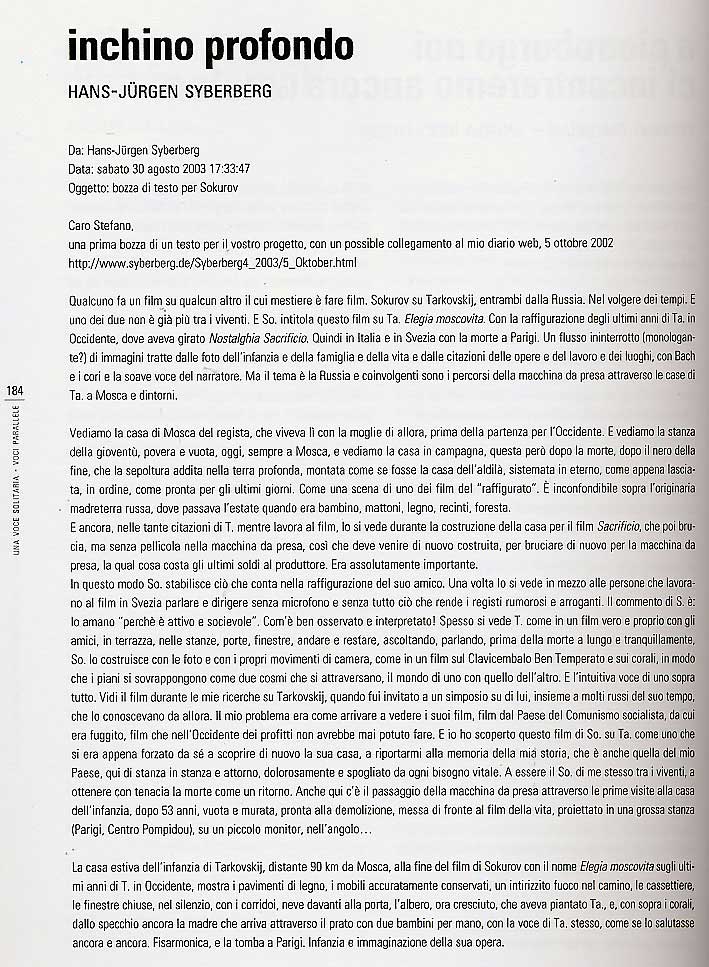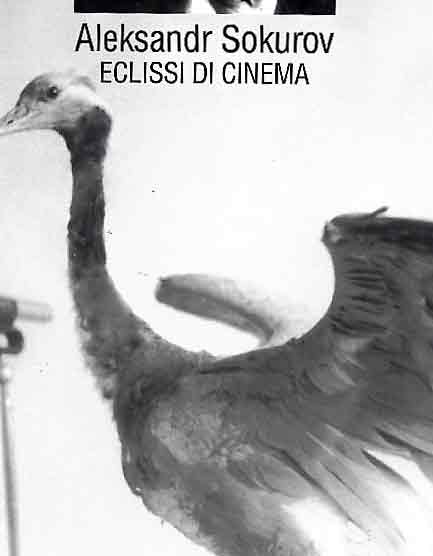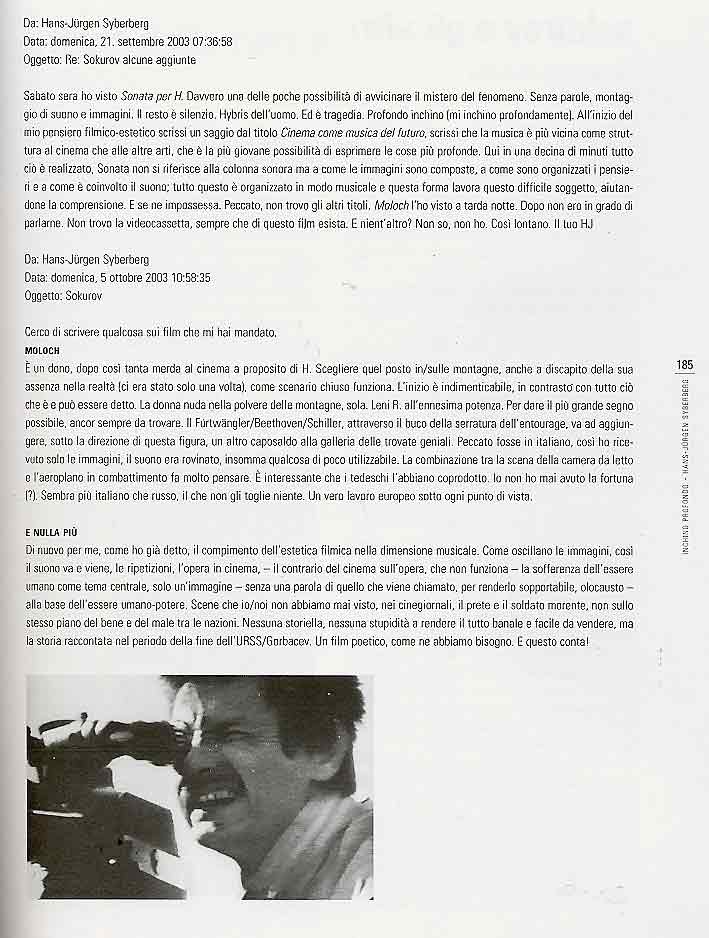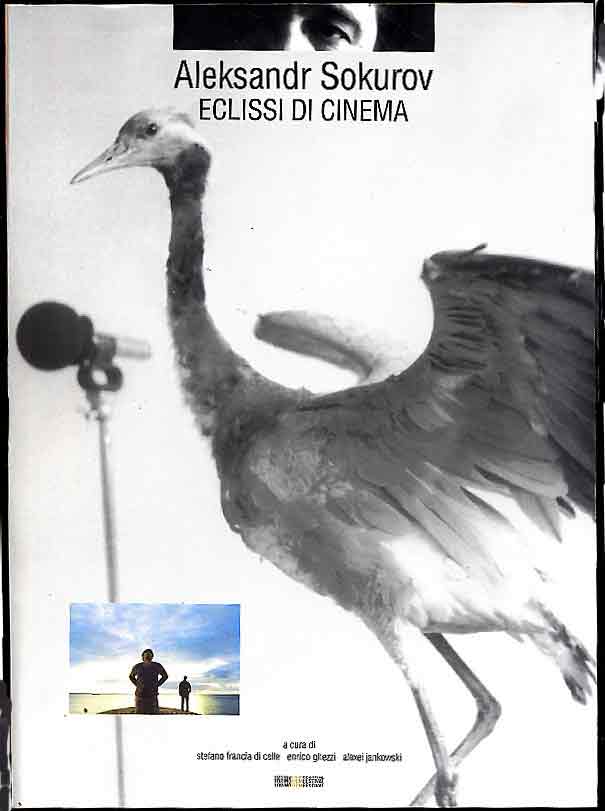Shall try to write about the two films you send me now.
Moloch
After so much shit in case of H. on film it's a gift. To chose this place in/over
the mountains, even, inspite of his absentia there in reality(he was there only
once), as a close scenery that works. The beginning is unforgettable, in the
contrast to all that is and can be said. The nacked women in the dust of the
mountains alone. Leni R. in one overkill. To give the utmost sign, that is alwas
to find. The Furtwängler /Beethoven/Schiller, through the kyhowle of the
entourage to combine whith the direction of this figure an other hit in the gallery
of trouvails. Pitty in italien, so I had only the pictures, the sound was hit,
so sometimes not available. The combination of bed-scene and airplan in the fight
gives a lot to think. Interesting that the germans coproduced. I had not the
luck(?). It looks more italien than russian, whithout lost. A real europeen work
in all matters.
An nothing more.
Again, as I said, for me the fulfilling film-aesthique in musical dimention.
As the pictures flowting, the sound comes and goes, the repititions, the opera
in film, - the conterary to the film on the opera, that does not work-, the suffery
of mankind as the big theme, only one picture, -whithout words of that, that
they call holocaust,- to make it bareable, on the basis of mankind-power. Scenes
I/we never saw, in the newsreels, the priest and the dieing soldier, not on the
level of bad and good beetwen countrys. No storytelling stupidites, making all
this cheap and easy to sell, but the history told in the period of the end to
the SU/Gorbatschov. A poetical film, as we need. One this matter!
Von:
Hans-Jürgen Syberberg <hjs@syberberg.de>
Datum: So, 21. Sep 2003 16:09:02 Europe/Berlin
An: stefano <stefanofrancia@yahoo.com>
Betreff: Re: Sokurov some additions
Saturdayevening, saw SONATA FOR H. Yes, one of the few possibilities to come
near to
the mystery of the phenomen. Whithout words, montage of sound and pictures. The
rest is silence. Hybris of mankind. And its tragedy. Tiefe Verbeugung. At the
begining of my film-aesthetical thaughts I wrote an essey with the titel Film
as music of the future, I thaught, that music is near as a strukture than other
kinds of art, if film as youngest possibility to express deepest things, is understood.
Here in some 10 minutes its done, Sonata means not the soundtrack. How are the
pictures are komposed und the thaughts set, the sound is involved in that, thats
done like music does and works in this difficult subjekt, -with repetitions,
insisting rhythm, spirtual montages-, helping to understand. And overcome by
heart.
Pity, I dont find the other titles. MOLOCH I saw late in the night I think. Was
not able to speak after about. Dont find the tape, if it exists from that. And
nothing more ? dont know, dont have. So far. Yours HJ
Von: Hans-Jürgen Syberberg <hjs@syberberg.de>
Datum: So, 5. Okt 2003 10:58:35 Europe/Berlin
An: stefano <stefanofrancia@yahoo.com>
Betreff: Sokurow
Shall try to write about the two films you send me now.
Moloch
After so much shit in case of H. on film it's a gift. To chose this place in/over
the mountains, even, inspite of his absentia there in reality(he was there only
once), as a close scenery that works. The beginning is unforgettable, in the
contrast to all that is and can be said. The nacked women in the dust of the
mountains alone. Leni R. in one overkill. To give the utmost sign, that is alwas
to find. The Furtwängler /Beethoven/Schiller, through the kyhowle of the
entourage to combine whith the direction of this figure an other hit in the gallery
of trouvails. Pitty in italien, so I had only the pictures, the sound was hit,
so sometimes not available. The combination of bed-scene and airplan in the fight
gives a lot to think. Interesting that the germans coproduced. I had not the
luck(?). It looks more italien than russian, whithout lost. A real europeen work
in all matters.
An nothing more.
Again, as I said, for me the fulfilling film-aesthique in musical dimention.
As the pictures flowting, the sound comes and goes, the repititions, the opera
in film, - the conterary to the film on the opera, that does not work-, the suffery
of mankind as the big theme, only one picture, -whithout words of that, that
they call holocaust,- to make it bareable, on the basis of mankind-power. Scenes
I/we never saw, in the newsreels, the priest and the dieing soldier, not on the
level of bad and good beetwen countrys. No storytelling stupidites, making all
this cheap and easy to sell, but the history told in the period of the end to
the SU/Gorbatschov. A poetical film, as we need. One this matter!
Donnerstag,
den 19.Februar
Einladungen zu Sokurow für einen Katalog in Turin zu schreiben. Der Katalog
nun.
Sokurow /Tarkowsky als zwei der Gäste auf Bändern für das vorgesehene Workshop,
die Werkstatt in Brüssel, als Werkzeug zum Verständnis zu N. das eigentliche
Thema
WWW.Nossen-Dorfkirche.de und
die 4
Web-cams
mit den Besuchern
von bis
16 000 Visitors wie in Paris 2003 täglich. wenn wir die Kirche wieder reparieren.
Stück um Stück.
Tarkowsky/Sokurow wissen warum.
Von:
stefano <stefanofrancia@yahoo.com>
Datum: So, 21. Sep 2003 21:22:40 Europe/Berlin
An: "Hans-Jürgen_Syberberg" <hjs@syberberg.de>
Betreff: Re: Fwd: Sokurov some additions
Dear Hans-Jürgen, sunday evening. The work in progress goes on. I don't
find any more the list of vhs I sent you. May be I forgot AND NOTHING
MORE. I made a big mistake because I think in any case it could be very
interesting for you. Also this film is composed only by footage. Here
is the synopsis:
And Nothing More
“
Tertium non datur…”
1982–1987, 70 min., colour
scenario: A. Nikiforov
The first title for this film was “The Allies.” The film is about
the
coalition formed between the USSR, Great Britain and the USA against
Hitler, formed as rebuff to the aggressive fascism of Germany during
the World War II. Unique archive footage from the time, shot by
cameramen from the different countries at war, here becomes associated
by the film–maker with a contemporary meditation on the post–war
destiny of civilisation, on the humanitarian losses for both sides and
on finding the uncertain hope for a world unity to counteract evil.
The film is based on unexpected editing tempos, on the musical
associations that arrange the images in our minds.
The Allied leaders, Stalin, Roosevelt and Churchill, are included in a
mosaic of otherwise anonymous but real people, those who determined the
character of this tragic epoch as much as these great political figures
—
if not more so. The tragic atmosphere of the war and the times
created in this film was unacceptable for the Central TV authorities
even though they had commissioned the film in anticipation of the
Fortieth Anniversary of the Victory over Nazi Germany. Sokurov's film
did not answer the requirement of propaganda and was “shelved” — that
is, hidden from its spectators. In the Perestroika years, the film was
legally shown for the first time.
Tomorrow monday I send you a tape (unfortunately in original version
with Italian sub-titles) with TNT courier (in 24 hours it will arrive
in Munchen). And if I succeed I will put also MOLOCH.
I will let you know tomorrow after shipment.
Ciao a big hug, Stefano-- Hans-Jürgen_Syberberg <hjs@syberberg.de> ha
scritto: >
Anfang der weitergeleiteten E-Mail:
Von: Hans-Jürgen Syberberg <hjs@syberberg.de>
Datum: So, 21. Sep 2003 07:36:58 Europe/Berlin
An: Hans-Jürgen Syberberg <hjs@syberberg.de>
Betreff: Re: Sokurov some additionsAm Samstag, 20.09.03 um 21:31 Uhr schrieb
Hans-Jürgen Syberberg:
Saturdayevening, saw SONATA FOR H. Yes, one of the few
possibilities
to come near to
the mystery of the phenomen. Whithout words, montage of sound and
pictures. The rest is silence. Hybris of mankind. And its tragedy.
Tiefe Verbeugung. At the begining of my film-aesthetical thaughts
I
wrote an essey with the titel Film as music of the future, I
thaught,
that music is near as a strukture than other kinds of art, if film
as
youngest possibility to express deepest things, is understood.
Here
in some 10 minutes its done, Sonata means not the soundtrack. How
are
the pictures are komposed und the thaughts set, the sound is
involved
in that, thats done like music does and works in this difficult
subjekt, helping to understand. And overcome.
Pity, I dont find the other titles. MOLOCH I saw late in the
night I
think. Was not able to speak after about. Dont find the tape, if
it
exists from that. And nothing more ? dont know, dont have. So far.
Yours HJ
______________________________________________________________________
Yahoo! Mail: 6MB di spazio gratuito, 30MB per i tuoi allegati, l'antivirus, il
filtro Anti-spam
http://it.yahoo.com/mail_it/foot/?http://it.mail.yahoo.com/



Einer
macht einen Film über den anderen, dessen Hauptberuf ist, Filme zu machen.
Sokurow über Tarkowski, beide aus Russland. In der Wende der Zeiten. Und
der eine, der schon nicht mehr unter den Lebenden ist. Und So. nennt dieses
Film über Ta. Moskauer Elegie. Mit der Darstellung der späten Jahres
des Ta. im Westen,wo er Nostalgia und Das Opfer drehte. Also in Italien und
in Schweden mit dem Tod in Paris. Ein monologischen Fluss der Bilder aus Fotos
der Kindheit und Familie und des Lebens und Zitaten des Werks und von der Arbeit
und den Orten, zu Bach und Chören und der sanften Stimme des Berichtenden.
Thema aber ist Russland und am ergreifensten sind die Kamera-Gänge durch
die Wohnungen Ta.s in Moskau und Umgebung.
Wir sehen die Wohnung in Moskau vor dem Weggang in den Westen, des Regisseurs
, die er bewohnte mit seiner derzeitigen Frau dort. Und wir sehen der Zimmer
der Jugend, arm und leer heute in Moskau, und sehen das Haus auf dem Lande,
dies aber nach dem Tode, nach dem schwarz des Endes, das die Beerdigung in
der fernen Erde zeigt, so geschnitten als sei es das Haus des jenseits, auf
ewig eingerichtet, wie eben verlassen, aufgeräumt wie zu letzten Tage
bereitet. Wie eine Szene aus den Filmen des Dargestellten. Backsteine, Holz,
mit Zäunen, Wald und unverwechselbar auf ur-russischer Erde, wo er seine
Sommer als Kind verbrachte.
Immer wieder, in den verschiedenen Zitaten von T. bei der Arbeit am Film, sieht
man ihn lange bei Errichten des Haues für den Film Nostalgia, das dann
abbrennt, wie das Drehbuch es will, aber ohne Material in der Kamera, so dass
es noch mal gebaut werden musste, um wieder abzubrennen für die Kamera,
was dem Produzenten sein letztes Geld kostete. Es war wohl wichtig.
So setzt So. die Gewichte in der Darstellung seines Freundes. Einmal sieht man
ihn inmitten der Leute des Films in Schweden reden und dirigieren, ohne Mirkophon
und all dessen, was Regisseure laut und hochmütig macht. Der Kommentar von
S. ist : sie liebten ihn for beeing active and sociable. Wie schön beobachtet
und gedeutet.
Oft sieht man T. wie in eigenen Filmen mit Freunden , auf Terrassen, in Zimmern,
Türen, Fenstern, gehen und stehen, hörend, redend, vor dem Tode lange
und still, So. baut ihn ein, in die Fotos und eigenen Kamera–Gänge,
als einen Film zum Wohltemperierten Klavier und Kirch-Chören, dass die überlagernden
Ebenen wie zwei Kosmen sich durchdringe, die Welt des einen mit der anderen.
Dazu die intuitive Stimme des einen über allem.
Ich sah den Film bei meinen Recherchen zu Tarkowski, als ich zu ein Symposium über
ihn eingeladen war, neben vielen Russen seiner Zeit, die ihn dorther kannten.
Meine Frage war, wie seltsam soviel seiner Filme aus dem Land des sozialistischen
Kommunismus kommen zu sehen, das er floh, die er im Westen des Profits nie hätte
machen können.
Und ich entdeckte diesen Film über Ta. von So. als einer, der nun selbst
aufgebrochen war, sein Haus wieder zu entdecken, heimzuholen ins Gedächtnis
nun meiner Geschichte, die auch die des Landes ist, hier von Raum zu Raum und
rundum, schmerzlich und entblösst von jedem liebenden Gebrauch. Mir selbst
nun mein So. zu sein unter den Lebenden, abzutrotzen des Tote als Rückkehr.
Auch hier gibt es den Gang mit der Kamera bei der ersten Besichtung des Hauses
der Kindheit, nach 53 Jahren, leer und zugemauert und dem Abriss freigegeben,
gegenübergestellt nun den Filmen des Lebens , projiziert im grossen Raum
(Paris, Centre Pompidou),auf kleinem Monitor, in der Ecke..
Das Sommerhaus der Kindheit Tarkowskis , 9o KM entfernt von Moskau, am Ende des
Films von Sokurow mit dem Namen Moskauer Elegie über die letzten Jahre T.s
im Westen, zeigt die Holzböden, die sorgsam erhaltenen Möbel und Wände,
ein klammes Feuer im Kamin, mit Läden verschlossene Fenster in der Stille
mit ruhigen Gängen und Schwenks, Schnee vor der Tür, den nun erwachsenen
Baum, den Ta. pflanzte, und dann zu den Chören noch mal die Mutter aus dem
Spiegel mit zwei Kindern an der Hand über die Wiese kommend, mit Ta.s Stimme
selbst, wie sie ihm wieder und wieder zuwinkt. Zieharmonika, und das Grab in
Paris. Kindheit und Imagination seines Werks ineins.





